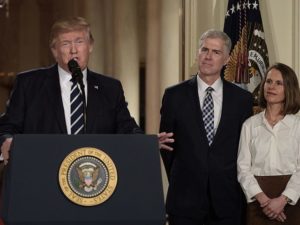
President Donald Trump with Judge Neil Gorsuch and his wife, Marie Louise Gorsuch. Photo by BRENDAN SMIALOWSKI/AFP/Getty Image
Newly elected President Donald Trump announced Judge Neil Gorsuch of the United States Court of Appeals for the 10th Circuit in Denver as his nominee for the Supreme Court, a choice that could lock in a conservative court and have far-reaching effects on the American justice system for decades.
Trump declared his pick for the highest court in the land during a prime-time ceremony in the East Room of the White House Tuesday, Jan. 31. The announcement came on the heels of an eventful three days marred with hostile public reactions and fiery protests following the president’s executive order banning Syrian refugees from entering the U.S. and temporarily suspending travel from seven Muslim-majority countries in the Middle East.
In the midst of the chaos, Trump’s Supreme Court pick is poised to spark an ideological war between liberals and conservatives over the future of the high court. If the nomination goes through, Gorsuch, 49, will take the place of former Justice Antonin Scalia, who died of natural causes in February 2016. After Scalia’s death, Republicans in the Senate denied then President Obama the right to chose the next Justice by refusing to hold hearings for his pick, Merrick Garland.
If Gorsuch’s nomination is confirmed, he also will revive the 5-to-4 split between liberal and conservative justices on the court, giving the swing vote back to Justice Anthony Kennedy, according to The New York Times. Though Kennedy is a conservative, he has handed down rulings that fall on both sides of the political gamut.
Moreover, due to the ages of the existing justices (two are 80, another is 78), it’s likely that Trump will secure another conservative justice pick in the coming years, giving conservatives a solid 6-3 voting majority. This will have an effect on civil and voting rights, affirmative action, a women’s right to choose and expanded corporation rights in the future. This possibility has the liberal wing of the Democratic party up in arms, with some declaring open opposition to Gorsuch shortly after the announcement of his nomination.
“Social issues, particularly social issues that are at the intersection of religion and federal government and society, tend to be extremely important in America and they’ve been tools for politics in America for a long period of time, for both sides of politics,” Professor Gordon Flake, CEO of the Perth USAsia Centre at the University of Western Australia said. “So, the nomination of Supreme Court justices has taken on an outsized importance in [American] society because of the relationship between their decisions as final arbiter on a lot of these social issues.”
So what happens now that Trump has announced Gorsuch as his pick? The tedious confirmation process begins.
First, the nominee will be required to fill out a lengthy questionnaire and pay courtesy visits to seasoned senators on Capitol Hill. During this pre-hearing period, both Democratic and Republican committee members will conduct an inquiry into the nominee’s history that they will use to vet him during the nomination hearing.
Gorsuch likely will face tough scrutiny from Democrats in the Senate during his confirmation hearings by the Senate Judiciary Committee, a 20-member panel of 11 Republicans and nine Democrats that must approve Gorsuch by a majority vote for him to be passed on to the full Senate for a vote. The Democrats do not have the votes to prevent Gorsuch from being moved out of committee to the full Senate for a vote.
This is where things could get interesting, though. Under normal Senate rules, it takes 60 votes to approve a Supreme Court nominee. There are 52 Republicans in the Senate; that means Democrats can effectively block — or “filibuster” — the confirmation, if fewer than eight Democrats support Trump’s pick for the high court.”
This would force Republicans into what has been dubbed the “nuclear option,” where they change the Senate rules to make it a simple majority vote of 51 to approve Gorsuch to the Supreme Court. The Republicans would need to hold their then-majority in place to change the rules. Already, there is one Republican Senator balking at such a dramatic rule change, Susan Collins of Maine. Collins has stated that she is not “a proponent of changing the rules of the Senate” according to NPR.
This already has led Senate Leader Mitch McConnell, who led the campaign to deny Obama his right to fill the seat, to hypocritically ask that Democrats not be obstructionists. “The Senate should respect the result of the election and treat this newly elected president’s nominee in the same way that nominees of newly elected presidents have been treated,” he said.
The deep indignation among Senate Democrats over the Republicans’ refusal to hold any confirmation hearings for former President Barack Obama’s Supreme Court nominee increases the likelihood that they’ll attempt to hinder Gorsuch’s confirmation with a filibuster on the Senate floor, leading to a showdown.


